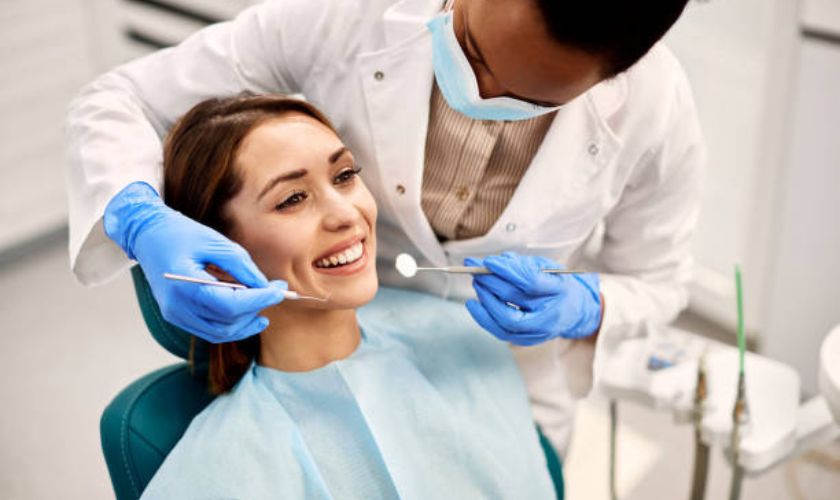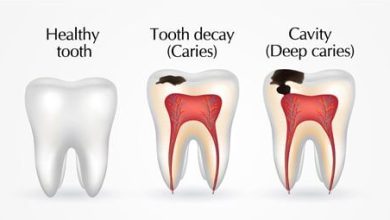Dental Hygienist 101: Secrets to Perfect Oral Health

A dental hygienist focuses on oral health and provides preventative dental care. They clean teeth, examine patients for oral diseases, and offer valuable advice on maintaining good oral hygiene.
Maintaining good oral health is essential for overall well-being. Dental hygienists are crucial in promoting oral health by providing preventative dental care. They clean teeth, remove plaque, and examine patients for signs of oral diseases. Additionally, they educate individuals on proper oral hygiene practices and offer advice on diet and lifestyle choices that can impact dental health.
By regularly visiting a dental hygienist, individuals can proactively prevent dental issues and ensure a healthy smile. Taking care of our oral health improves our appearance and contributes to our overall quality of life by preventing gum disease, tooth loss, and other oral health concerns.
Importance Of Regular Dental Hygiene
Regular dental hygiene is essential for maintaining healthy teeth and gums. Dental hygienists play a crucial role in preventing oral diseases by providing professional cleanings, educating patients on proper oral care, and detecting potential issues early on. Trusting a dental hygienist can help ensure a bright smile and optimal oral health.
A healthy smile enhances your appearance and plays a crucial role in maintaining overall well-being. Neglecting your dental hygiene can lead to various oral health issues, impacting your quality of life. This is where dental hygienists come in.
They play a significant role in helping you maintain excellent oral health through preventive care and education. In this section, we will explore the importance of regular dental hygiene, the role of dental hygienists, and strategies to prevent common dental issues.
Oral health and its impact on overall well-being:
- Good oral health goes beyond having clean teeth and fresh breath. It influences your overall well-being in several ways.
- Poor oral hygiene can lead to dental problems such as cavities, gum disease, and tooth loss, affecting your ability to chew and speak properly.
- Research has shown a connection between oral health and various systemic diseases like cardiovascular diseases, diabetes, respiratory infections, and even pregnancy complications.
- Maintaining good oral hygiene habits, such as brushing and flossing regularly, can help prevent these issues and contribute to your overall health.
Role of Dental Hygienists in Maintaining Oral Health:
- Dental hygienists are licensed oral health professionals specializing in preventing and treating oral diseases.
- They work alongside dentists to provide preventive care and educate patients about oral hygiene practices.
- Dental hygienists perform thorough dental cleanings, removing plaque, tartar, and stains that brushing alone cannot eliminate.
- They also assess patients’ overall oral health, including evaluating the gums, teeth, and oral tissues to identify any signs of disease or abnormalities.
- In addition to cleanings, dental hygienists may take X-rays, apply fluoride treatments, and provide personalized oral health instructions to patients.
- By promoting regular dental visits and educating patients about oral hygiene, dental hygienists play a crucial role in preventing dental issues and maintaining oral health.
Common Dental Issues and Their Prevention Strategies:
Dental caries (cavities): Cavities are one of the most common dental problems, primarily caused by poor oral hygiene and a diet high in sugary and acidic foods. Preventive strategies include:
- Brushing twice daily with fluoride toothpaste and flossing daily to remove plaque.
- Limiting the consumption of sugary and acidic foods and beverages
- Regular dental visits for professional cleanings and check-ups to detect cavities early.
- Dental sealants to protect the teeth from decay.
Gum disease (periodontal disease): Gum disease is an infection that affects the gums and supporting structures of the teeth. Prevention strategies include: - Brushing and flossing daily to remove plaque and prevent tartar buildup.
- Dental professionals advise using antimicrobial mouthwashes.
- Regular dental cleanings to remove tartar and assess gum health.
- Avoiding tobacco use, as it increases the risk of gum disease.
Tooth loss: Tooth loss can result from various factors, including gum disease, tooth decay, and dental injuries. Prevention strategies include: - Practicing good oral hygiene habits, including brushing, flossing, and mouthwash.
- Visiting the dentist regularly for early detection and treatment of dental issues.
- Wearing mouthguards during sports activities to prevent dental injuries.
- Avoiding habits like smoking and excessive alcohol consumption as they increase the risk of tooth loss.
Maintaining regular dental hygiene is essential for optimal oral health and overall well-being. Dental hygienists play a vital role in promoting and ensuring the long-term health of your teeth and gums. By following preventive strategies and seeking professional dental care, you can prevent common dental issues and enjoy a healthy smile.
Essential Dental Hygiene Practices
Maintaining optimal dental hygiene is crucial for a healthy smile. Dental hygienists play a vital role in promoting good oral health by providing essential practices like regular teeth cleaning, gum care, and preventive treatments. By following their expert guidance, you can ensure the well-being of your teeth and gums.
Brushing Techniques For Optimal Plaque Removal
Proper brushing techniques play a crucial role in maintaining optimal dental hygiene. Here are some key points to keep in mind when brushing your teeth:
- Use a soft-bristled toothbrush: To avoid potential damage, the bristles should be gentle on your gums and teeth.
- Angle your brush: Hold your toothbrush at a 45-degree angle towards your gum line. This helps reach the plaque at the tooth-gum junction.
- Gentle circular motions: Brush your teeth using gentle circular motions. This motion effectively removes plaque and promotes gum health.
- Remember the back teeth: Pay equal attention to all your teeth, including the hard-to-reach molars. These areas are prone to plaque buildup.
- Brush your tongue: Gently brush your tongue to remove any bacteria that can cause bad breath.
- Duration matters: Brush your teeth for two minutes twice a day. Set a timer or use an electric toothbrush with a built-in timer to ensure you brush for the recommended time.
Importance Of Flossing And Interdental Cleaning
While brushing is essential, it alone cannot remove plaque from between your teeth and along the gumline. Flossing and interdental cleaning are necessary to maintain a healthy smile. Consider the following points:
- Flossing: Daily flossing helps remove food particles and plaque between teeth. Slide the floss gently between each tooth, following the curve of the tooth, and clean both sides.
- Interdental brushes: These tiny brushes are designed to clean the spaces between your teeth. Use them to gently clean these areas, reaching where regular toothbrushes can’t.
- Water flossers: An alternative to traditional flossing, water flossers use a stream of water to remove debris. They can be especially beneficial for individuals with braces or dental implants.
Mouthwash And Its Role In Promoting Oral Hygiene
Mouthwash can be a valuable addition to your oral hygiene routine. Here’s how it helps:
- Kills bacteria: Mouthwash formulations containing antimicrobial ingredients can help kill bacteria that cause bad breath, gingivitis, and cavities.
- Freshen breath: Mouthwash with a minty flavor can leave your mouth feeling fresh and your breath smelling pleasant.
- Reaches difficult areas: Swishing mouthwash around your mouth reaches areas that may be challenging to clean with a toothbrush or floss alone.
- Enhances saliva production: Certain mouthwashes can stimulate saliva production, which helps wash away food particles and neutralize acid in the mouth.
Remember, mouthwash is not a substitute for brushing and flossing. It should be used with proper oral hygiene practices for optimal results.
Maintaining A Healthy Diet For Oral Health
Maintain optimal oral health by following a healthy diet. A dental hygienist can guide you on the best foods for strong teeth and gums.
A healthy diet plays a crucial role in maintaining optimal oral health. What you eat can significantly impact the health of your teeth and gums. You can promote a healthy mouth by making mindful dietary choices and avoiding certain foods.
Here’s what you need to know:
Impact Of Diet On Oral Health
- Sugary foods and drinks: Consuming excessive sugar can lead to tooth decay and cavities. Sugary treats and beverages provide an ideal environment for harmful bacteria in the mouth to thrive, resulting in dental issues.
- Acidic foods and drinks: Foods and drinks with high acid content, such as citrus fruits, tomatoes, and sodas, can wear down tooth enamel over time. This can leave your teeth susceptible to decay and sensitivity.
- Nutrient deficiencies: A lack of essential nutrients, especially vitamins and minerals like calcium, vitamin D, and vitamin C, can weaken tooth enamel and increase the risk of gum disease.
Foods To Avoid For Healthy Teeth And Gums
To maintain a healthy mouth, it’s important to limit or avoid certain foods:
- Sugary snacks and beverages: Candies, sodas, energy drinks, and other sugary treats can harm oral health. Limiting their consumption can significantly reduce the risk of tooth decay.
- Citrus fruits and acidic foods: While they have health benefits, their high acid content can erode tooth enamel. Moderation is vital when consuming these foods.
- Sticky and chewy foods: Sticky candies, dried fruits, and chewy treats can cling to teeth, promoting bacterial growth and increasing the risk of cavities.
Nutritional Tips For A Healthy Mouth
To promote oral health, incorporate these nutrient-rich foods into your diet:
- Dairy products: Milk, cheese, and yogurt are excellent sources of calcium, a mineral essential for strong teeth and bones.
- Crisp fruits and vegetables: Crunchy fruits and vegetables, like apples, carrots, and celery, can help remove plaque and stimulate saliva production, keeping your mouth clean and fresh.
- Lean proteins: Foods like lean meat, poultry, fish, and eggs are rich in phosphorus, which, along with calcium, helps to strengthen tooth enamel.
- Green tea: Green tea contains polyphenols, which can suppress the growth of bacteria in the mouth, preventing tooth decay and gum disease.
- Water: Staying hydrated with water helps rinse away food particles and neutralize acids produced by bacteria in the mouth.
By being mindful of your diet and making nutritious choices, you can contribute to better oral health. Remember to practice good oral hygiene habits, such as brushing and flossing regularly, and visit your dentist for routine check-ups to maintain a healthy mouth.
The Link Between Oral Hygiene And Gum Disease
Maintaining good oral hygiene is crucial in preventing gum disease. A dental hygienist can help educate and guide individuals on proper oral care practices to keep their gums healthy and disease-free.
Understanding The Causes And Symptoms Of Gum Disease:
Gum disease, or periodontal disease, is a common oral health concern affecting many individuals. It occurs when the gums become infected due to the buildup of plaque and tartar on the teeth. Understanding the causes and symptoms of gum disease is essential for maintaining optimal oral hygiene.
Here are some key points to consider:
- Poor Oral Hygiene: Inadequate brushing and flossing can lead to the accumulation of plaque, a sticky film of bacteria that forms on the teeth. When this plaque hardens into tartar, it irritates the gums and causes inflammation.
- Smoking: Tobacco use, including smoking cigarettes or chewing tobacco, increases the risk of gum disease. Smoking weakens the immune system, making it more difficult for the body to fight infections and diseases, including gum disease.
- Hormonal Changes: Hormonal fluctuations, such as those that occur during pregnancy or menopause, can affect oral health. These hormonal changes can make the gums more susceptible to inflammation and infection, increasing the risk of gum disease.
- Diabetes: Individuals with diabetes are at a higher risk of developing gum disease. Diabetes impairs the body’s ability to fight infections, including those that affect the gums. Conversely, gum disease can worsen diabetes control, creating a vicious cycle.
- Common Symptoms: Detecting gum disease early is crucial for effective treatment. Some common signs and symptoms include red, swollen, or bleeding gums, persistent bad breath, loose teeth, receding gums, and changes in the bite. If you experience any of these symptoms, it’s essential to consult with a dental professional.
Importance Of Professional Dental Cleanings:
While regular brushing and flossing are vital for maintaining oral health, professional dental cleanings significantly prevent gum disease. Here’s why professional cleanings are essential:
- Deep Cleaning: Dental hygienists have the expertise and tools to clean your teeth and gums properly. They can remove plaque and tartar from hard-to-reach areas, preventing their buildup and reducing the risk of gum disease.
- Early Detection: During a professional dental cleaning, the dental hygienist examines your gums and teeth for any signs of gum disease. Detecting gum disease early allows for prompt treatment and can help prevent further damage to your oral health.
- Oral Health Education: Dental hygienists can provide valuable guidance on proper brushing and flossing techniques and recommend suitable oral care products. They can also discuss lifestyle factors that impact oral health, such as diet and tobacco use.
- Whole Body Health: Maintaining good oral hygiene is essential not only for your teeth and gums but also for your overall health. Research has shown that gum disease is associated with various systemic conditions, including heart disease, stroke, and diabetes. By preventing gum disease through regular dental cleanings, you can also promote your overall well-being.
Preventive Measures For Gum Disease:
Preventing gum disease is crucial for maintaining excellent oral health and avoiding potential complications. Here are some preventive measures you can take:
- Maintain a Consistent Oral Hygiene Routine: Brush your teeth at least twice daily and floss daily. Use a toothbrush with soft bristles and fluoride toothpaste. Consider using an antimicrobial mouthwash to reduce the risk of bacterial growth.
- Attend Regular Dental Check-ups: Schedule routine dental check-ups and cleanings every six months or as your dentist recommends. Regular visits allow for the early detection and treatment of oral health issues, including gum disease.
- Adopt a Healthy Lifestyle: Eat a balanced diet of fruits, vegetables, and whole grains. Limit sugary foods and beverages, as they contribute to tooth decay and gum disease. Avoid tobacco products and limit alcohol consumption.
- Manage Stress: High stress levels can weaken the immune system and increase the risk of gum disease—practice stress management techniques such as exercise, meditation, and relaxation exercises.
- Stay Hydrated: Drinking plenty of water helps maintain saliva production, which is vital to oral health. Saliva helps rinse away food particles and neutralize acids that can damage teeth and gums.
By implementing these preventive measures, you can significantly reduce your risk of gum disease and maintain a healthy smile. Remember, proactive oral hygiene is critical to long-term oral health.
Oral Health Care For Different Age Groups
Dental hygienists provide oral health care for individuals of all ages, ensuring proper dental hygiene and preventive care. Prospective patients can benefit from their expertise to maintain healthy teeth and gums.
Some might overlook it, but maintaining good oral health is crucial at every stage of life. From children to teenagers to older adults, everyone deserves proper dental care. In this section, we’ll explore the unique oral health considerations for different age groups, providing you with helpful tips and insights.
Dental Hygiene Tips For Children
- Start early: Clean your child’s mouth before the first tooth appears. Use a soft cloth or infant toothbrush to wipe their gums gently.
- Introduce a toothbrush: Use a small, soft-bristled toothbrush suitable for infants once the first tooth erupts.
- Fluoride toothpaste: As your child grows, smear a tiny amount of fluoride toothpaste (about the size of a rice grain) on their toothbrush.
- Teach proper technique: Encourage your child to brush their teeth gently using circular motions. Supervise and assist until they can effectively brush independently.
- Regular dental visits: Schedule your child’s first dental appointment by their first birthday. Regular dental check-ups and professional cleanings are essential for their oral health.
Oral Hygiene Considerations For Teenagers
- Brushing routine: Reinforce the importance of brushing teeth at least twice daily for two minutes each time. Please encourage them to use a soft-bristled toothbrush and fluoridated toothpaste.
- Flossing: Remind teenagers daily to remove plaque and food particles between teeth. Emphasize the significance of this habit for optimal oral health.
- Mouthguards: If your teenager participates in sports activities, recommend using a mouthguard to protect their teeth from potential injuries.
- Limit sugary snacks and drinks: Encourage teenagers to consume a balanced diet and limit their intake of sugary snacks and beverages. These can contribute to tooth decay.
- Tobacco and alcohol awareness: Discuss the detrimental effects of tobacco and excessive alcohol consumption on oral health. Help them understand the importance of avoiding these habits.
Oral Health Challenges For Older Adults
- Dry mouth management: Older adults are more prone to xerostomia (dry mouth). Advise them to stay hydrated, limit caffeine and alcohol intake, and consider using saliva substitutes.
- Regular dental visits: Stress the importance of regular dental check-ups and cleanings to promptly address any age-related oral health issues.
- Medication side effects: Discuss with older adults how certain medications can affect oral health. Please encourage them to inform their dentist about all the medications they are taking.
- Gum disease prevention: Emphasize the significance of thorough and gentle brushing, daily flossing, and antimicrobial mouthwashes to prevent gum disease.
- Denture care: If an older adult wears dentures, provide instructions for proper cleaning, maintenance, and regular check-ups with a dentist.
Remember, regardless of age, maintaining good oral hygiene practices and seeking professional dental care when necessary is essential for a healthy smile. By following these age-specific dental hygiene tips, you can prioritize oral health and enjoy a lifetime of healthy teeth and gums.
The Role Of Dental Hygienists In Preventive Care
Dental hygienists play a crucial role in preventive care by providing professional teeth cleaning, oral health assessments, and education on proper dental hygiene techniques. With their expertise, they help patients maintain healthy smiles and prevent oral diseases.
Dental Hygienist
Dental hygienists play a crucial role in preventive care, ensuring the overall oral health of individuals. Regular dental check-ups and cleanings are imperative for maintaining healthy teeth and gums. These professionals provide professional oral health advice, helping patients establish good oral hygiene practices at home.
In this section, we will delve into the responsibilities of dental hygienists, the importance of regular dental check-ups and cleanings, and the valuable oral health advice they offer.
Explanation Of Dental Hygienists’ Responsibilities
Dental hygienists have a range of responsibilities to promote oral health and prevent dental issues. These include:
- Conducting initial oral assessments: They examine patients’ oral health and identify any potential problems, such as signs of gum disease or tooth decay.
- Performing dental cleanings: Dental hygienists thoroughly clean patients’ teeth, removing plaque, tartar, and surface stains.
- Applying treatments: They may apply fluoride treatments and sealants to protect teeth from decay.
- Educating patients: Dental hygienists provide essential education on proper oral hygiene practices, including brushing techniques, flossing, and dental products.
- Taking dental x-rays: They may take dental x-rays to assist the dentist in diagnosing and identifying dental issues.
Maintaining good oral hygiene is crucial to preventing dental problems, and dental hygienists play a key role in helping patients achieve this.
Importance Of Regular Dental Check-ups and Cleanings
Regular dental check-ups and cleanings are the foundation of oral health. Here’s why they are essential:
- Early detection of dental issues: Regular visits to the dental hygienist allow for the early detection of dental problems such as cavities, gum disease, and oral cancer. This enables prompt treatment and prevents further complications.
- Thorough dental cleaning: Professional cleanings remove plaque, tartar, and surface stains that cannot be addressed through regular brushing and flossing alone. This helps prevent the buildup of harmful bacteria that can lead to tooth decay and gum disease.
- Oral cancer screening: Dental check-ups often include an oral cancer screening. Early detection of oral cancer significantly increases the chances of successful treatment.
- Personalized oral health advice: Dental hygienists offer personalized advice tailored to patient’s specific oral health needs. They educate individuals on proper brushing techniques and the importance of flossing and recommend dental care products suited to their oral health requirements.
By prioritizing regular dental check-ups and cleanings, individuals can maintain optimal oral health and prevent dental problems before they escalate.
Professional Oral Health Advice From Dental Hygienists
Seeking professional oral health advice from dental hygienists can make a significant difference in maintaining a healthy smile. Here are some beneficial tips they offer:
- Brush at least twice a day: Dental hygienists emphasize the importance of brushing teeth at least twice a day using a soft-bristled toothbrush and fluoride toothpaste.
- Floss daily: Regular flossing helps remove plaque and food particles between the teeth and along the gum line, reducing the risk of gum disease.
- Use fluoride products: Dental hygienists recommend fluoride toothpaste and mouthwash to strengthen tooth enamel and protect against tooth decay.
- Maintaining a balanced diet: A diet rich in fruits, vegetables, and fiber while low in sugary snacks and beverages contributes to oral health.
- Quit smoking: Dental hygienists highlight the detrimental effects of smoking on oral health, including an increased risk of gum disease, tooth loss, and oral cancer.
By following the professional advice of dental hygienists, individuals can take proactive steps toward maintaining a healthy and beautiful smile.
Regular dental check-ups, professional dental cleanings, and personalized oral health advice from dental hygienists are vital preventive care components. These measures help individuals keep their teeth and gums healthy, detecting and addressing potential dental problems early on. By adhering to these recommendations, individuals can enjoy optimal oral health and a confident smile for years.
Maintaining Oral Health During Orthodontic Treatment
Maintain good oral health while undergoing orthodontic treatment with the help of a dental hygienist. Receive expert guidance and tips for brushing, flossing, and overall oral hygiene to ensure a healthy and confident smile throughout your orthodontic journey.
Dental hygiene is essential for maintaining oral health, especially during orthodontic treatment. Braces or aligners can create some unique challenges when it comes to keeping your teeth clean. However, with the right approach and guidance from dental hygienists, you can ensure that your teeth remain healthy and cavity-free throughout your orthodontic journey.
Oral Hygiene Challenges With Braces Or Aligners:
- Food particles and plaque buildup: Wires, brackets, or aligners can make it easier for food particles to get trapped, leading to plaque buildup and an increased risk of tooth decay.
- Difficulties in brushing and flossing: The intricate braces design can make it challenging to brush and floss effectively. Cleaning around the brackets and wires may require extra effort and time.
- Gum inflammation and sensitivity: Orthodontic appliances can sometimes cause gum inflammation and increased sensitivity. This may require special attention and care to maintain healthy gums.
Tips For Cleaning And Caring For Orthodontic Appliances:
- Regular brushing and flossing: Brush your teeth at least twice daily using a soft-bristled toothbrush. Pay extra attention to cleaning around the brackets and wires. Use floss threaders or interdental brushes to effectively remove plaque and food debris from between the teeth and around the braces.
- Use of fluoride toothpaste and mouthwash: Incorporate fluoride toothpaste into your oral hygiene routine to strengthen tooth enamel and prevent cavities. Additionally, using a fluoride mouthwash can provide an extra layer of protection for your teeth.
- Maintain a healthy diet: Avoid sticky and sugary foods that can quickly get stuck in your braces or aligners. Opt for a balanced diet of fruits, vegetables, and lean proteins to support optimal oral health.
- Regular dental check-ups: Schedule regular dental visits to ensure that your orthodontic treatment is progressing well and to address any oral hygiene concerns. Dental hygienists can provide professional cleanings to remove stubborn plaque and offer personalized advice on maintaining oral hygiene with orthodontic appliances.
Importance Of Close Collaboration With Dental Hygienists:
- Personalized guidance and support: Dental hygienists educate and guide patients through their orthodontic journey. They can provide specific advice on maintaining oral health with braces or aligners and address concerns.
- Regular monitoring of oral health: Dental hygienists work closely with orthodontists to monitor your oral health throughout treatment. They can identify any early signs of tooth decay or gum issues and provide proactive interventions to prevent further damage.
- Customized oral hygiene strategies: Every orthodontic patient is unique, and dental hygienists can develop personalized oral hygiene strategies based on your specific needs and orthodontic treatment plan. They can help you navigate the challenges of cleaning around braces or aligners effectively.
Maintaining oral health during orthodontic treatment is crucial for preventing tooth decay, gum issues, and other oral hygiene problems. By following the tips provided by dental hygienists and maintaining regular communication with them, you can ensure that your smile stays healthy and beautiful throughout your orthodontic journey.

Credit: www.mylakewindsdental.com
Frequently Asked Questions For Dental Hygienist
What Does a Dental Hygienist Do?
A dental hygienist performs teeth cleanings, x-rays, and oral health screenings. They educate patients on proper oral hygiene and help prevent dental issues by identifying and treating early gum disease and tooth decay signs.
How Often Should I See a Dental Hygienist?
It is recommended to see a dental hygienist every six months for a routine cleaning and check-up. However, your dentist may suggest a more frequent schedule if you have specific dental concerns or conditions that require closer monitoring.
Can a dental hygienist whiten my teeth?
Yes, dental hygienists can perform teeth-whitening procedures. They use professional-grade whitening agents and techniques to remove stains and brighten your smile safely. However, it’s essential to consult your dentist or dental hygienist to determine if teeth whitening suits you.
What Qualifications Are Required to Become a Dental Hygienist?
To become a dental hygienist, one must complete an accredited dental hygiene program and obtain a license in their respective state. These programs typically take two to three years to complete and include coursework in physiology, anatomy, and dental hygiene techniques.
Conclusion
The role of a dental hygienist is essential in maintaining oral health and preventing dental diseases. Their expertise in oral hygiene techniques, preventive dental care, and patient education ensures the well-being of patients. Dental hygienists play a crucial role in promoting good oral health and preventing oral diseases by providing regular cleanings, screenings, and personalized instructions on proper dental care.
Moreover, with their extensive knowledge, they assist in identifying potential dental issues and help the dentist with treatment plans. Their gentle and compassionate approach helps patients feel comfortable and confident during dental visits. Overall, dental hygienists are an integral part of any dental practice, contributing to individuals’ overall health and well-being.
So, next time you visit your dental office, remember the important role dental hygienists play in maintaining your healthy smile.






5 Comments